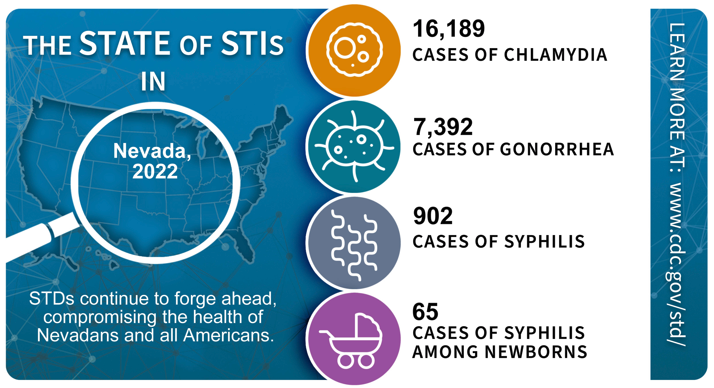STI Awareness Week 2024

More than 2.5 million cases of chlamydia, gonorrhea, and syphilis were reported in 2022. CDC released the 2022 Sexually Transmitted Disease Surveillance report that provides the most current and complete data for nationally notifiable sexually transmitted infections (STIs).

To find a clinic near you for STI testing click here!
Wondering how you can protect yourself from STIs? It’s as simple as Talk. Test. Treat.
Be willing to:
TALK
Talk openly and honestly to your partner(s) and your healthcare provider about sexual health and sexually transmitted infections, or STIs.
Talk with your partner(s) BEFORE having sex. Not sure how? We have tips to help you start the conversation. Make sure your discussion covers several important ways to make sex safer:
- Talk about when you were last tested and suggest getting tested together.
- If you have an STI (like herpes or HIV), tell your partner.
- Agree to only have sex with each other.
- Use condoms the right way for every act of vaginal, anal, and oral sex throughout the entire sex act (from start to finish).
Talk with your healthcare provider about your sex life as it relates to your health. This helps your healthcare provider understand what STI tests you should be getting and how often.
Here are a few questions you should expect and be prepared to answer honestly:
- Have you been sexually active in the last year?
- Do you have sex with men, women, or both?
- In the past 12 months, how many sexual partners have you had?
- Do you have anal, oral, or vaginal sex?
- What are you doing to protect yourself from infection?
Not all medical checkups include STI testing, so don’t assume that you’ve been tested unless you discuss it with your provider. If your provider does not discuss sex or STI testing with you, bring it up.
Ask your healthcare provider whether certain vaccines, like the hepatitis B vaccine or the HPV vaccine are right for you.
Be willing to:
TEST
Get tested. It’s the only way to know for sure if you have an STI.
Many STIs don’t cause any symptoms, so you could have one and not know. If you’re having sex, getting tested is one of the most important things you can do to protect your health.
Learn which tests CDC recommends for you. Even if you’re pregnant, you can still get an STI. If you’re having sex, you’re still at risk.
Find out what STI care options are available near you. In addition to traditional, in-person visits, other options that may be available include:
- Video or phone appointments with your healthcare provider.
- Express visits allow walk-in STI testing and treatment appointments without a full clinical exam.
- Pharmacies and retail clinics, such as at a grocery store or big-box store, for on-site testing and treatment.
- At-home collection where you collect your own sample and take or mail it to a lab for testing.
If you’re not comfortable talking with your regular healthcare provider about STIs, find a clinic near you that provides confidential testing that’s free or low cost.
And of course, be willing to:
TREAT
If you test positive for an STI, work with your healthcare provider to get the correct treatment.
Some STIs can be cured with the right medicine, and all STIs are treatable. Make sure your treatment works by doing these things:
- Take all of the medication your healthcare provider prescribes, even if you start feeling better or your symptoms go away.
- Don’t share your medicine with anyone.
- Avoid having sex again until you and your sex partner(s) have all completed treatment.
Your healthcare provider can talk with you about which medications are right for you.
Prepare Before You’re There
Click here to take a brief interactive quiz to see if you’re at risk for an STI and then access resources or tools to help you make a “game plan” in advance.

